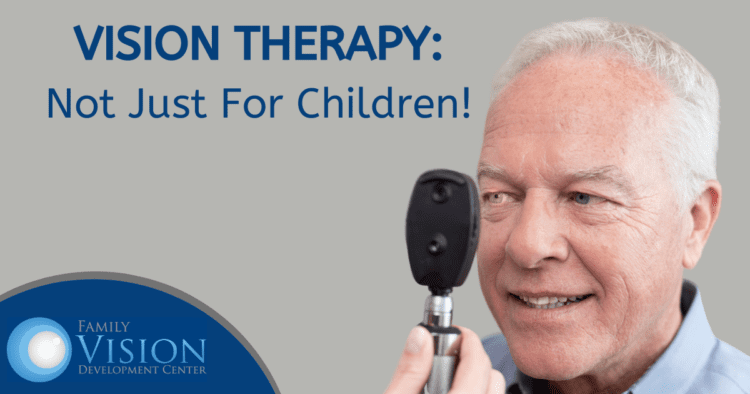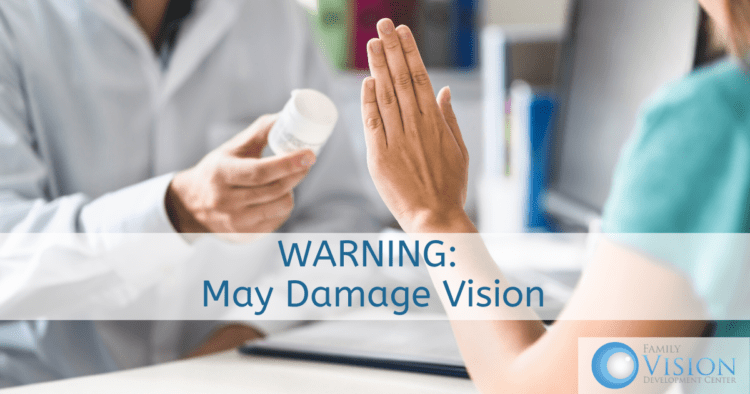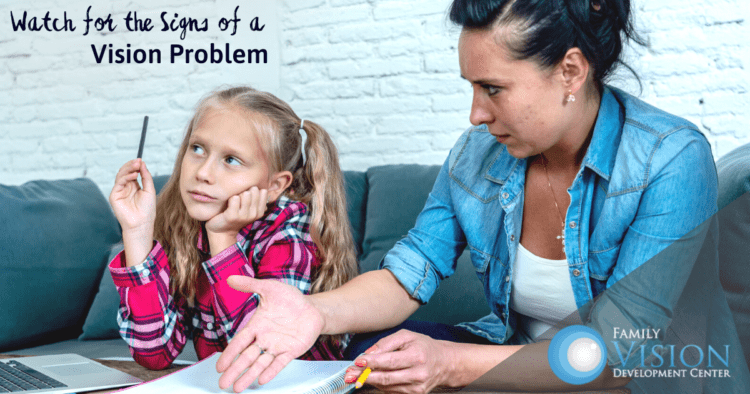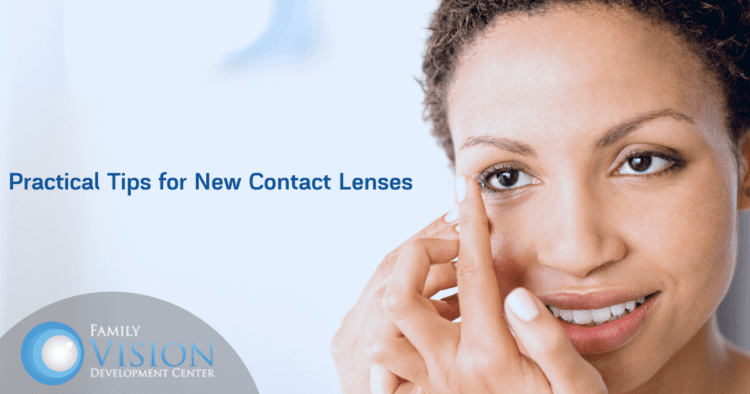As Vision Therapy continues to gain in popularity, more and more children are receiving treatment to correct eye conditions as early as possible. However, Vision Therapy is not just for little ones- adults can benefit too! In the past, the old school of thought was that certain eye conditions could not be corrected after childhood. Today, we know this is simply not true. Studies show that adults suffering from eye conditions such as lazy eye or crossed eyes can greatly benefit from Vision Therapy.
Double Vision (Diplopia)
Double vision, or diplopia, can occur due to a number of contributing factors. Adults with this condition often have trouble in one or both eyes, which can cause one image or object to appear as two. Vision Therapists utilize techniques that help adults with diplopia regain visual control which can improve their balance and movement. In this aspect, Vision Therapy can help adult patients improve their quality of life as well as their vison.
Crossed Eyes or Wandering Eye (Strabismus)
Strabismus is known by many other names such as cross-eyed, wandering eye, squint, wall eye, and more. This condition occurs when a patient’s eye/eyes are not aligning properly, and one may “turn” instead of focusing on a target that both eyes are pointed at. In order to help a patient retrain their brain and eyes to coordinate, Vision Therapists can use tools such as eye patches and focus shifting exercises. Improvement with this condition can not only help adults feel more confident, but can also increase their ability to read, write and work more effectively.
Lazy Eye (Amblyopia)
Amblyopia is a condition where one eye is dominate over the other, and therefore the two do not work together as they should. The non-dominate eye suffers from reduced vision. Through a series of eye exercises that both improve vision in the lazy eye and help with eye/brain communication, Vision Therapy can be very effective in correcting Amblyopia.
If you are an adult suffering from any of the above eye conditions, contact Family Vision Development Center right away to set up a comprehensive eye exam. Our specialty is neuro-optometric rehabilitation and vision therapy, and we will customize a program to meet your individual needs. Visit us online or call 630-862-2020 to schedule an appointment at our Aurora location at 452 N. Eola Rd.
Additional information referenced here and here.
In today’s busy world there are many things that can take a toll on your vision: from stress, to environmental issues, to your own bad habits. But did you know that certain medications can also negatively impact your eyesight? Side effects can range from minor issues like dryness, to permanent damage including loss of vision.
Watch Out For These Drugs
While this is not an all-inclusive list of medications to watch out for, these are a few more commonly used prescription drugs that have been linked to vision issues:
- Corticosteroids
- Diuretics (water pills)
- Antihistamines
- Osteoporosis drugs
- Antidepressants
- Cholesterol medication
- Alpha and Beta-blockers
- Ulcer medication
- Birth control pills
- Acne medication
- Erectile dysfunction medications
- And more
If you have glaucoma or diabetes, you should be especially careful to monitor your medication’s side effects. Elderly patients and those who take medications for longer periods of time can also be more at risk for vision issues depending on the drug taken and the dosage amount.
Read the Labels Carefully
Your vision is a precious gift and it’s important that you protect it. Get in the habit of reading the warning labels on your medications carefully – including anything you purchase over-the-counter. Even herbal supplements and vitamins can have an effect on your vision. Knowledge is a key element of practicing good vision self-care.
Talk to Your Doctor
If you suspect that your eye problems are related to your medication, talk to your prescribing doctor immediately but do NOT stop taking the medication until instructed to do so.
In addition, always see your eye doctor if you notice vision changes, regardless of what you suspect the cause may be. Be sure to let your eye doctor know what medications you are taking- including prescriptions, over-the-counter, and herbals- and the dosage amount of each.
At the Family Vision Development Center, our philosophy is of “whole body wellness” that extends beyond the eyes. Reach out to us if you are concerned about your vision and side-effects of your medications. We provide comprehensive services in our family-friendly office with an exceptionally dedicated and well-trained staff. Call us at 630-862-2020 to schedule an appointment for your eye exam or use our convenient online appointment request form.
Additional information referenced here and here.
Vision therapy, which is also known as vision training or visual training, is an individualized treatment program that is like physical therapy for the eyes and brain. Through customized eye exercises, patients can develop or recover normal visual skills that may have been impaired due to a wide range of vision disorders.
While individuals of all ages can benefit from vision therapy, it can be especially helpful for young children with learning disabilities or those suffering from lazy eye, crossed eyes or focusing issues. Vision deficits can cause eyestrain, blurred or double vision, and headaches that make it difficult to stay focused while reading, maintaining attention in the classroom or focusing on close work. Vision therapy can help correct these visual deficits. With vision therapy, children are better positioned to achieve their full potential, both in and out of the classroom.
Could your child benefit from vision therapy? These common signs can indicate that there is an underlying vision problem.
- Your child has poor hand-eye coordination, which may be evident in poor handwriting, motor coordination, athletic performance, etc.
- Your child has problems walking or running, and frequently drops objects or bumps into things
- Your child holds a book or object unusually close
- Your child closes one eye or covers the eye with his/her hand
- Your child omits or confuses small words when reading
- Your child reverses words when reading (e.g., “no” for “on”) or transposes numbers (e.g., “21” for “12”)
- Your child complains frequently of headaches, eyestrain, nausea, dizziness and/or motion sickness
- Your child frequently avoids or objects to doing homework
- Your child exhibits behavior problems in school
Regular eye exams can detect vision problems that standard screenings do not
Even though your child may receive vision screenings at school, these tests do not diagnose the many vision conditions that a comprehensive eye exam does. It is important to be diligent when it comes to your child’s vision – especially if you notice any of the above signs of a problem. Vision therapy can be an excellent form of treatment, and a successful outcome is even greater when issues are diagnosed early on. At Family Vision Development Center, vision therapy is our specialty. Dr. Martin is specially trained to treat a variety of vision related conditions using complete vision therapy services designed to restore and improve visual efficiency. Contact us today at 630-862-2020 or visit us online to schedule your appointment.
Contacts are a smart choice for individuals who are active and dislike the feeling of wearing glasses. However, the process of caring for and getting used to new contacts can take a week or two. Navigate the transition with ease by learning how to properly care for contacts and becoming familiar with common symptoms that occur when you first wear them.
What to Expect When First Wearing Contacts
As with any new eye prescription, it may take a few days for your eyes and brain to adjust to the changes. New prescriptions may cause mild headaches or slight dizziness. If this persists after the first week, it may be a sign that your prescription needs to be adjusted.
New contacts can also sometimes cause mild eye irritation during the first few days of use as you get used to the new sensation. You may feel uncomfortable that there is something in your eye or notice when your lenses begin to dry out. After a day or two, these symptoms typically go away. Remember that these minor issues are normal, and all a part of getting used to something new. However, if you continue to experience eye irritation after a week, or have any concerns at all, contact us for recommendations.
Practice, Practice, Practice!
Getting comfortable putting in your new contacts can take some time. It can be a strange feeling touching your eye like that and you may wonder if you are doing it correctly. We will give you specific instructions during your appointment, but the more you practice, the easier it will become. Soon it will become a very natural part of your daily routine.
Caring for Your New Contacts
One of the most common causes of eye irritation is improper care for contact lenses. There are certain things you should always remember when caring for your new contacts:
- Always wash your hands before and after touching your eyes to avoid spreading bacteria. Also, be certain that all soap residue is thoroughly rinsed before touching the lenses.
- Remember that tap water is not appropriate to clean your contact lenses. Only use the contact lens solution provided by your eye doctor to avoid damaging the lenses and to ensure they are disinfected properly.
- Storing your new contacts properly is another very important task. Always use fresh solution to store your contacts overnight. Reusing contact solution may cause eye irritation or infection.
Proper Follow-Up Care
Remember that caring for your new contacts also includes getting regular eye exams to make sure that problems do not go undetected. Serious infections can occur if lenses are not cared for properly, so visiting us on a regular basis can help ensure proper use and address any prescription issues. Contact us at 630-862-2020 to make your appointment for your new contacts this year! We have a wide variety of choices available in the latest lens technology, and can find the right lenses for your specific lifestyle.





